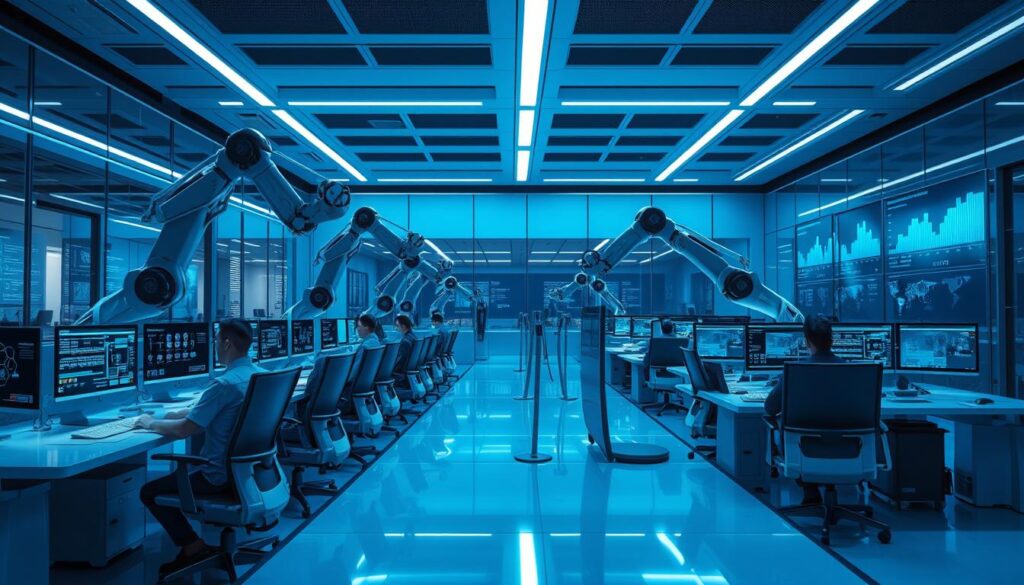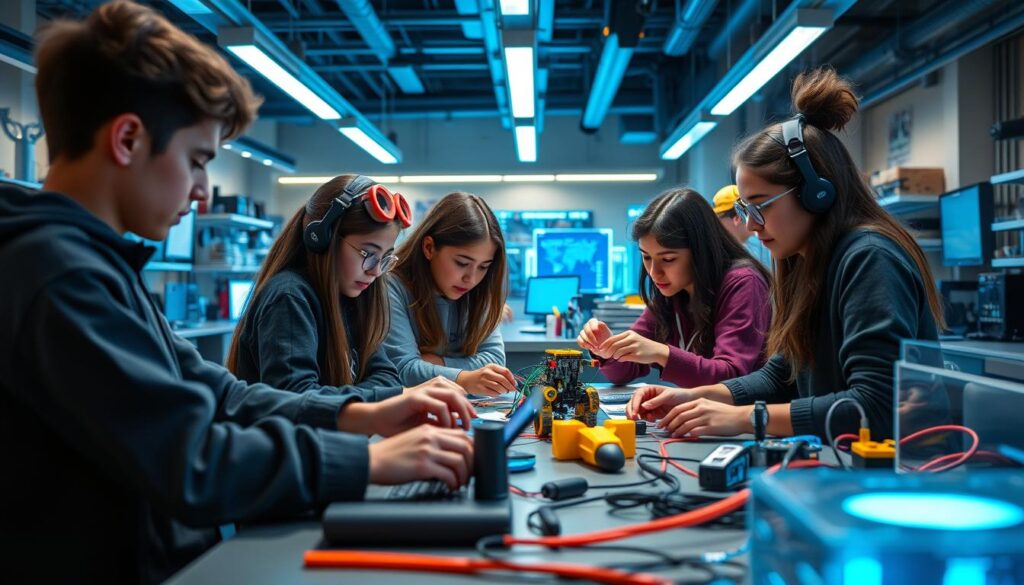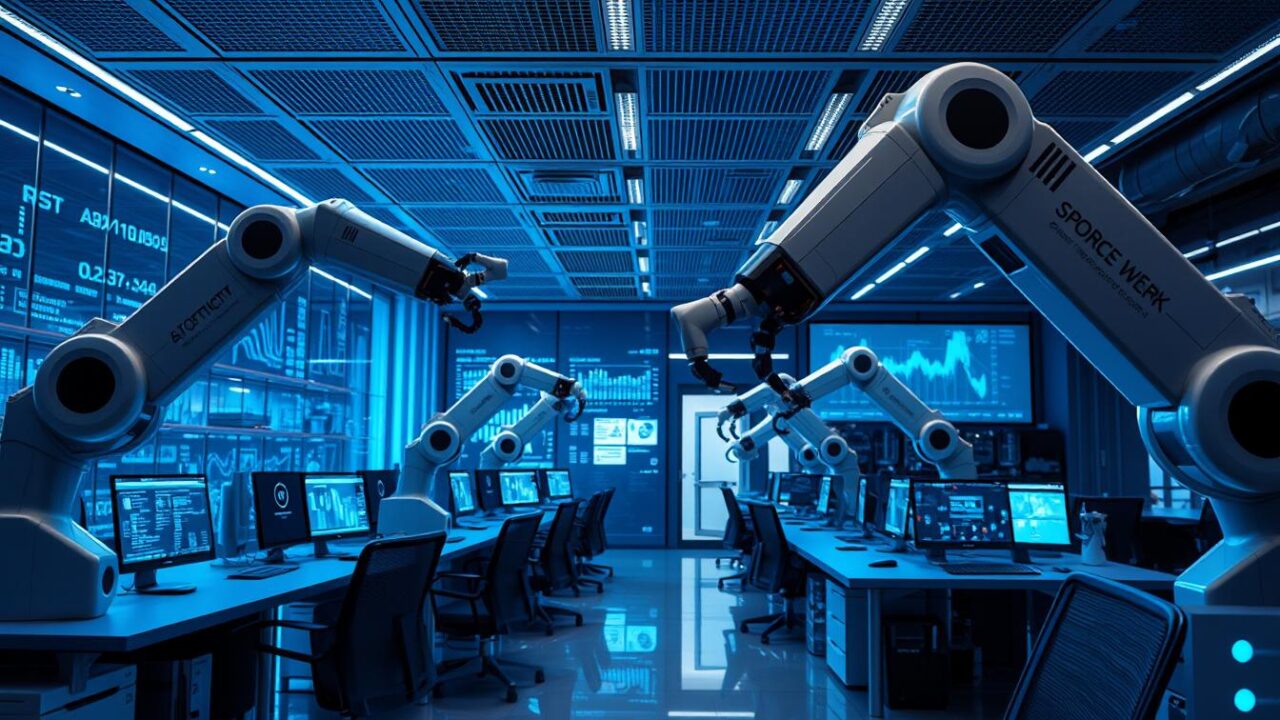The global IT and BPO services industry, with 16 million workers, is expected to lose 7.5% of its workforce by 2022. This change is mainly due to the fast growth of artificial intelligence and automation. These technologies are changing the way entry-level knowledge work is done. As AI changes traditional career paths, especially for new graduates, the future of work is uncertain.
AI’s impact on entry-level jobs will be huge, with 750,000 jobs lost in India and the U.S. alone. High-wage areas will see more job losses. But, jobs that need medium skills, like customer service, are growing. This change is making companies and workers rethink what skills are needed in an AI world.
The global services industry is moving towards jobs that need experience and skills like abstract thinking. The traditional career ladder might face big changes. AI could remove the entry-level jobs, letting graduates focus on soft skills like communication and problem-solving. But, it’s a challenge to create new jobs fast enough to keep up with the changes.
Key Takeaways
- AI and automation are projected to decrease the global IT and BPO services workforce by 7.5% by 2022
- Entry-level knowledge jobs are prime targets for automation, potentially disrupting traditional career pathways
- The workforce is shifting towards roles that require experience, expertise, and the ability to manage machine-learning tools
- The removal of the bottom rung of the career ladder by AI could allow graduates to focus on developing soft skills
- The challenge lies in creating new jobs at a pace that matches the digitization of existing roles
The Impact of AI on Entry-Level Knowledge Jobs

Artificial intelligence (AI) is changing entry-level jobs fast. Generative AI is leading this change. It automates tasks and boosts productivity, affecting career paths for new graduates and entry-level roles.
A study found that AI could handle up to 32% of entry-level tasks soon. This change is big in the US tech sector, where AI is used to automate tasks. As a result, AI is taking over many entry-level jobs, using machine learning to make processes better and faster.
Generative AI Disrupting Career Pathways for University Graduates
Generative AI is changing how university graduates start their careers. AI is doing routine tasks and handling data, changing entry-level jobs. This means graduates need to learn new skills to keep up in the job market.
But AI isn’t all bad news. It could help junior employees grow faster in their careers. Those who know how to use AI well are in demand. They can help with tasks that add more value to their companies.
“The rapid advances in AI are anticipated to eliminate jobs with routine elements, data-related tasks, and writing responsibilities.” – Recent study on AI’s impact on the workforce
Entry-Level Roles Replaced by AI Automation
AI is taking over many entry-level jobs. Machine learning is used for tasks like data analysis, customer service, and even writing. This change is big in finance, healthcare, and tech, where AI can do things faster and better than people.
This might mean some jobs disappear, but it also means new chances to learn and grow. Workers can move into roles that need skills like thinking creatively and understanding emotions. As companies use AI, they’ll need people who can work with these systems, opening up new paths for those who can adapt.
A recent article points out the need for workers to learn AI skills. Entry-level jobs are disappearing because of automation and generative AI.
AI Transforming the Nature of Work

The rise of artificial intelligence (AI) is changing work in big ways. It could make things more efficient and productive. Research shows AI and automation could add $3.5 trillion to $5.8 trillion annually, or 40 percent of all analytics value. But, this AI transformation also brings challenges, especially for jobs.
Jobs Retooled Rather Than Destroyed
There’s worry AI and automation might lead to many job losses. But, studies show it might not be that simple. AI could change jobs, not just get rid of them. For example, in China from 2006 to 2020, AI and robots actually led to more jobs.
This positive effect on jobs comes from better productivity, more capital, and a better division of labor. AI could open new opportunities and drive growth in many fields.
Shifting Focus to Soft Skills Desired by Employers
As AI handles routine tasks, the need for soft skills grows. Employers want creative thinking, problem-solving, and AI tool skills. This change shows we need to adapt and learn new skills to work with technology.
“The Future of Jobs 2020 report by the World Economic Forum predicts the disruption of 85 million jobs in 15 industries worldwide over the next five years due to automation and the new division of labor between humans and machines.”
To keep up, workers must keep learning and improving their skills. By focusing on soft skills and working with AI, people can thrive in the new job market.
Preparing Students for an AI-Driven Workforce

Universities are key in preparing students for an AI-driven job market. By 2030, up to 375 million workers might need new jobs due to AI and automation. To help, universities focus on co-curricular and extra-curricular activities, short courses, and flexible degrees.
Maximizing Co-Curricular and Extra-Curricular Opportunities
Universities now stress the value of co-curricular and extra-curricular activities. These include work placements, years abroad, clubs, and societies. They help students develop soft skills that employers value.
The University of Florida (UF) leads in AI workforce development. It infuses AI and data science into all academic areas. The Career Connections Center at UF educates students on AI’s impact on careers, offering AI education and workshops.
Companies like Accenture, IBM, Microsoft, Facebook Machine Learning, Deloitte, Google, Ernst & Young, General Electric, Gartner, Oracle, Visa, and hire UF students and alumni with AI experience.
Short Courses and Flexible Degrees for Skill Development
Universities also work with governments to offer short courses and flexible degrees. These programs focus on in-demand skills like data science, cybersecurity, and AI ethics. By 2025, 97 million new jobs may emerge due to AI, especially in these areas.
“Learning prompt engineering skills could lead to potential career growth, with roles paying up to $335,000 a year.” – Microsoft’s 2023 Work Trend Index
As AI changes the job market, students must embrace lifelong learning. Universities offer flexible learning options and focus on both technical and soft skills. This helps students face the challenges and opportunities of an AI-driven workforce.
entry-level knowledge jobs are much easier to automate using AI
Artificial intelligence is making entry-level jobs more likely to be automated. These jobs often involve repetitive tasks and data processing. AI can handle large amounts of data quickly and accurately, which is good for businesses looking to save money and work more efficiently.
In manufacturing, AI and robotics are taking over manual jobs, improving accuracy and speed. Intelligent automation is also changing customer service, with AI chatbots and virtual assistants handling many queries. Automated checkouts and self-service kiosks are also reducing the need for cashiers in stores.
Many entry-level jobs are at risk of being automated. For instance, AI tools are now doing basic graphic design and text translations. Even simple photography tasks are being handled by AI.
“The rapid advancement of AI technology is reshaping the job market, particularly for entry-level knowledge workers. Organizations must adapt and invest in upskilling their workforce to remain competitive in the era of automation.” – Sarah Thompson, AI Workforce Expert
The effect of AI on entry-level jobs is clear. With AI, employers expect more from these workers, making it harder to get these jobs. AI models are being developed for many industries, speeding up the automation of these tasks.
To stay ahead in the job market, entry-level workers need to develop skills that AI can’t replace. Skills like critical thinking, problem-solving, and emotional intelligence are key. As AI gets better, the type of work available will change, making it crucial to be adaptable and keep learning.
Potential Benefits and Challenges of AI in the Workplace
Artificial intelligence (AI) is changing how we work. It brings big AI benefits like more efficiency and productivity. But, it also brings challenges like changing roles and career growth.
In many industries, AI is making a big difference. Danske Bank used AI to automate over 250 tasks, saving the work of 300 people. HSBC used AI to find more financial crimes, cutting false positives by 60%. These examples show how AI can make work better and more accurate.
Increased Efficiency and Productivity
AI can make work more efficient and productive. It automates simple tasks, letting people do more creative and complex work. This can make companies perform better and save money.
Coca-Cola used AI to improve its supply chain, cutting stockouts by 20% and improving forecasts by 15%. General Electric saved a lot by using AI for maintenance. These examples show AI’s power to save money and improve work.
Reshaping Roles and Career Growth
AI changes jobs and career paths. Some jobs might disappear, but new ones will appear. People need to learn new skills to keep up.
“The future of work is not about replacing humans with machines, but rather about leveraging AI to augment human capabilities and create new opportunities for growth.” – John Smith, AI Expert
Employers must help employees grow in an AI world. They should offer training to help people learn new skills. This helps both the employee and the company.
As we move forward with AI, we must see both sides. We should use AI to make work better but also help people adapt. This way, we can use AI to grow and succeed in the future.
Building an AI-Powered Workforce
AI is changing the workplace. Companies must adapt to use this technology fully. They need to redesign their organizations, provide the right tools, and encourage learning.
Integrating AI into the workforce requires a special ecosystem. It should mix traditional tech with AI and automation smoothly. Companies must adopt new AI tools and rethink their structures for better human-machine collaboration.
McKinsey says AI could create over 2 million jobs in healthcare by 2030. This shows AI’s potential to create jobs and change industries.
Redesigning Organizational Structures
Adopting AI means changing how companies are organized. Silos need to be broken down. Cross-functional teams are key to using AI well.
These teams should work together, even if people from different generations are involved. A dynamic work environment helps unlock AI’s full potential.
Providing the Right Tools and Continuous Learning
Companies must give their employees the right tools and resources. This includes AI interfaces that use text, voice, and sight. These tools are changing jobs in many industries.
For example, AI call bots can start conversations with customers. Voice interfaces help in manufacturing and logistics by guiding employees.
“AI fills the ‘cognition gap’ by performing complex cognitive functions that support human decision-making.” – Industry Expert
Providing the right tools is just the start. Companies must also focus on continuous learning. As jobs change, employees need to learn new skills.
Investing in employee development is key. It helps build a workforce that can work well with AI.
The Debate on AI’s Impact on Jobs
The debate on AI’s job market impact is intense. Some fear job losses, while others see new opportunities. It’s important to look at the facts to make smart predictions.
A McKinsey & Company report says AI could create 20-50 million new jobs by 2030. The World Economic Forum predicts AI will replace 75 million jobs but add 133 million new ones. This means a net gain of 58 million jobs.
While some jobs might disappear, like in manufacturing, others like healthcare and education could grow. This shows AI’s impact is complex.
AI’s role in the workforce goes beyond just creating or destroying jobs. It also changes job demands and brings new roles, such as:
- AI Trainers and Teachers
- Data Analysts and Scientists
- Human-Machine Teaming Managers
- AI Ethics and Policy Specialists
Balancing Benefits and Challenges
AI brings both good and bad. It can make work more efficient and grow the economy. A study showed AI can boost worker performance by up to 40% when used right.
But, we must worry about privacy, security, job loss, and bias. To keep up, people should learn in-demand skills like data analytics and programming. Staying updated and being open to change is key.
Companies need to help their workers get better at these skills. This way, everyone can thrive in the AI age.
Upskilling and Reskilling for the AI Era
Artificial intelligence (AI) is changing the workplace fast. Upskilling and reskilling are key for workers to keep up. A BCG study found only 6% of people have started upskilling seriously, even though 89% know they need better AI skills.
AI’s impact on jobs worries many. A 2024 Gallup poll showed 25% of workers fear their jobs might be automated. This fear has grown from 15% in 2021, showing the need for quick adaptation.
To stay ahead, about 40% of the workforce will need new skills in the next three years, say executives. Customer service roles, for example, need better skills in handling customer interactions and creating prompts. Almost 70% of finance leaders think half their team needs new skills in 2024.
Upskilling and reskilling aren’t just for customer service and finance. Healthcare is using AI to speed up diagnoses. HR is using AI to sift through job applications, making it crucial for them to learn this tech.
“Embracing upskilling and reskilling is no longer an option; it’s a necessity for businesses to thrive in the AI-driven future.” – Sarah Johnson, Chief Talent Officer at TechCorp
Automation is changing jobs in many fields, like manufacturing and customer service. Skills like AI, cybersecurity, and data analytics are becoming more important. Online courses and bootcamps are helping people learn these skills.
It’s important for companies to encourage learning. They should offer training, reward employees for learning, and support their leaders. By doing this, companies can keep their workforce skilled and competitive in the AI age.
AI’s Potential to Automate Cognitive and Transactional Tasks
Artificial intelligence (AI) is getting better and better. It can now automate tasks in many industries. A study looked at 17,879 tasks and 24,758 AI patents from 2015 to 2022. It shows how AI is changing the job market.
The study created the AI Impact (AII) score. It compares tasks to AI patents to see how much AI can change things. This score helps us understand how AI might disrupt jobs.
Impact on Middle-Layer Roles in Administration, Customer Service, and Analytics
AI is changing jobs in administration, customer service, and analytics. These jobs often have repetitive tasks that AI can do. As AI gets smarter, it can make decisions that humans used to.
AI is not just for simple tasks. It can even handle complex tasks under pressure, like air traffic controllers. This means companies need to think about how AI will affect their workers.
The Need for Systems to Retain and Redeploy Workers
Companies need to keep and move workers around as AI changes jobs. They should train employees to keep up with new technology. AI recruitment tools help find the right skills for new jobs.
As AI changes work, companies must balance using it and supporting their workers. By focusing on keeping and moving workers, companies can use AI well. This way, employees stay important to the company’s success.
Conclusion
AI is changing the workforce, especially in entry-level jobs. It’s important for everyone to get on board with this change. AI can do simple tasks like data work, but it can’t replace human skills like creativity and critical thinking.
For new graduates and entry-level workers, learning skills AI can’t do is crucial. Skills like creative problem-solving and communication are key. Companies need to change how they work and offer training to keep up with AI.
AI’s impact on jobs is complex, but we should talk about it based on facts, not rumors. By supporting AI progress and protecting workers, we can build a strong workforce for the future. Focusing on learning, skill development, and adapting to AI will help us succeed in this new era.
Want to hire me as a Consultant? Head to Channel as a Service and book a meeting.

